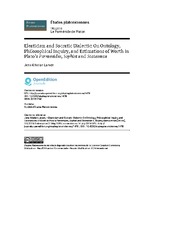Eleaticism and Socratic Dialectic: On Ontology, Philosophical Inquiry, and Estimations of Worth in Plato’s Parmenides, Sophist and Statesman.
Peer reviewed, Journal article
Published version

Åpne
Permanent lenke
https://hdl.handle.net/1956/22687Utgivelsesdato
2019-05-01Metadata
Vis full innførselSamlinger
- Department of Philosophy [240]
Originalversjon
https://doi.org/10.4000/etudesplatoniciennes.1478Sammendrag
The Parmenides poses the question for what entities there are Forms, and the criticism of Forms it contains is commonly supposed to document an ontological reorientation in Plato. According to this reading, Forms no longer express the excellence of a given entity and a Socratic, ethical perspective on life, but come to resemble concepts, or what concepts designate, and are meant to explain nature as a whole. Plato’s conception of dialectic, it is further suggested, consequently changes into a value-neutral method directed at tracing the interrelation of such Forms, an outlook supposedly documented in certain passages on method from the Sophist and the Statesman as well. The article urges that this reading is untenable. For in the Parmenides the question for what entities one should posit Forms is left open, and the passages on method from the Sophist and Statesman neither encourage a non-normative ontology nor a value-neutral method of inquiry. What the three dialogues encourage us to do is rather to set common opinions about the relative worth and value of things aside when conducting ontological inquiries; and this attitude, the article concludes, demonstrates a close kinship, rather than a significant difference, between Plato’s Socrates and his Eleatic philosophers.
